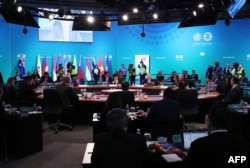Vietnam is seeking closer relations with Australia in an effort to limit Chinese expansion in the South China Sea.
On March 15, Vietnam and Australia signed a strategic partnership to increase contacts between high-level officials of the two countries. Australian officials have described the agreement as an upgrade to partnerships in effect since 2009. The latest partnership includes promises to deal with “security threats,” and work together on “maritime policy-making.”
Vietnam wants help in controlling Chinese interests in the South China Sea. Australia hopes to increase its business and security interests in Southeast Asia.
Frederick Burke is a lawyer in Ho Chi Minh City. He spoke about the partnership between Australia and Vietnam.
“To the extent that they’re both concerned about especially things like freedom of navigation and the East (China) Sea. They have a shared interest with Vietnam in keeping the sea lanes open.”
China and Vietnam have disputes over sovereignty issues in the South China Sea. Taiwan and three other Southeast Asian countries also have territorial claims in the same area.
Experts say Vietnam is seeking better relations with other nations to protect fishing boats, energy exploration at sea and its territorial claims.
Australia belongs to an alliance that includes India, Japan and the United States.
Heads of state from that group met in the Philippines in November to discuss how to keep the South China Sea open. Australia and Japan called for “rules-based order” and “respect for international law.”
Vietnam and India upgraded their strategic partnership last year. In 2014, Japan agreed to sell Vietnam six ships and boats for gathering intelligence. This month, the United States sent an aircraft carrier group to Vietnam.
South China Sea dispute
China’s government has angered other claimants to parts of the South China Sea over the past 10 years. Chinese crews have built up and developed small islands in the sea for possible military use. And Chinese coast guard ships have sailed in waters near areas claimed by other claimants. Australia has no claim to the sea.
But both Australia and Vietnam consider China their top trading partner. Observers say this means the countries are unlikely to enter into conflict with China at sea.
Trung Nguyen is international relations dean at the Ho Chi Minh University of Social Sciences and Humanities. He says Vietnam may be interested in help from Australia because it cannot tell what the United States will do in the South China Sea dispute.
“With the [multi-country foreign] policy, Vietnam can develop some kind of counterbalance against China in the case of the absence of American presence in the region. Even though Australia is a second-tier power, in some sense they can make up for the U.S. in some aspects when the U.S. is going back to an America-first policy.”
Australian business interests
Australia signed the partnership with Vietnam as a way to improve relations with the 10-member Association of Southeast Asian Nations (ASEAN). Australian officials consider ASEAN’s members as an important market for Australian companies.
This month, the Vietnamese airline company Vietjet said it plans to begin flights between Ho Chi Minh City and the Australian city of Brisbane. It said the goal is to help with “integration and trade exchange” in the area.
In 2016 and 2017, trade between Australia and Vietnam reached $9 billion. That amount makes Vietnam Australia’s 15th largest trading partner.
I’m Jonathan Evans.
Ralph Jennings reported this story for VOA News. Jonathan Evans adapted it for Learning English. George Grow was the editor.
_____________________________________________________________
Words in This Story
absence – n. a state or condition in which something expected, wanted, or looked for is not present or does not exist;
aspects – n. a part of something
tier – n. a level or step in a group or organization
counterbalance – n. weight than balances another weight
maritime - adj. of or relating to sailing on the sea or doing business such as trading by sea
sovereignty – n. controlling influence; unlimited power
extent – n. the point or limit to which something extends
strategic – adj. related to a general plan; useful in carrying out a plan
navigation – n. the science of getting ships, airplanes or spacecraft from place to place






